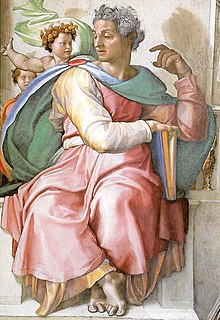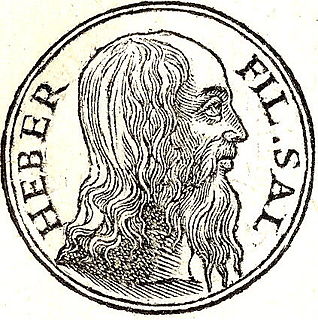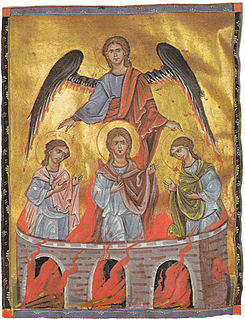
The Bible is a collection of religious texts or scriptures sacred to Jews, Samaritans, Christians, Rastafari and others. It appears in the form of an anthology, a compilation of texts of a variety of forms that are all linked by the belief that they are collectively revelations of God. These texts include theologically-focused historical accounts, hymns, prayers, proverbs, parables, didactic letters, poetry, and prophecies. Believers also generally consider the Bible to be a product of divine inspiration.

David is described in the Hebrew Bible as king of the United Monarchy of Israel and Judah. In the Books of Samuel, David is a young shepherd who gains fame first as a musician and later by killing the giant Goliath, champion of the Philistines. He becomes a favorite of King Saul and a close friend of Saul's son Jonathan. Worried that David is trying to take his throne, Saul turns on David and tries to kill him, leading the latter to go on the run and operate as a fugitive for several years. After Saul and Jonathan are killed in battle against the Philistines, a 30-year old David is anointed king over all Israel and then conquers Jerusalem, establishing the city as his capital, and taking the Ark of the Covenant into the city to be the center of worship in the Israelite religion.

The Book of Genesis is the first book of the Hebrew Bible and the Christian Old Testament. In Judeo-Christian traditions it is viewed as an account of the creation of the world, the early history of humanity, Israel's ancestors, and the origins of the Jewish people. Its Hebrew name is the same as its first word, Bereshit.

Isaiah was the 8th-century BC Israelite prophet after whom the Book of Isaiah is named.

Isaac is one of the three patriarchs of the Israelites and is an important figure in the Abrahamic religions, including Judaism, Christianity, and Islam. He was the son of Abraham and Sarah, the father of Jacob, and the grandfather of the twelve tribes of Israel.

Jacob, later given the name Israel, is regarded as a Patriarch of the Israelites and so is an important figure in Abrahamic religions, such as Judaism, Christianity, and Islam. Jacob first appears in the Book of Genesis, the son of Isaac and Rebecca, the grandson of Abraham, Sarah and Bethuel, the nephew of Ishmael. He was the second-born of Isaac's children, the elder being his fraternal twin brother Esau. However, by deceiving Isaac when he was old and blind, Jacob was able to usurp the blessing that belonged to Esau as the firstborn son, and become the leader of their family. Following a severe drought in his homeland Canaan, Jacob and his descendants, with the help of his son Joseph, who had since become a confidante of Pharaoh, moved to Egypt, where he died, aged 147 years, and was buried in the Cave of Machpelah.

In the biblical Book of Genesis, Cain and Abel are the first two sons of Adam and Eve. Cain, the firstborn, was a farmer, and his brother Abel was a shepherd. The brothers made sacrifices to God, each of his own produce, but God favored Abel's sacrifice instead of Cain's. Cain then murdered Abel, whereupon God punished Cain by condemning him to a life of wandering. Cain then dwelt in the land of Nod, where he built a city and fathered the line of descendants beginning with Enoch.

A Bible conspiracy theory is any conspiracy theory that posits that much of what is believed about the Bible is a deception created to suppress some secret, ancient truth. Some of these theories claim that Jesus really had a wife and children, or that a group such as the Priory of Sion has secret information about the true descendants of Jesus; some claim that there was a secret movement to censor books that truly belonged in the Bible, etc.

Holon is a city on the central coastal strip of Israel, south of Tel Aviv. Holon is part of the metropolitan Gush Dan area. In 2019 it had a population of 196,282. Holon has the second-largest industrial zone in Israel, after Haifa. Its jurisdiction is 19,200 dunams and its population is about 194,273 residents as of 2018 according to CBS data.

Eber is an ancestor of the Israelites and the Ishmaelites according to the "Table of Nations" in the Book of Genesis and the Books of Chronicles.

Delilah is a woman mentioned in the sixteenth chapter of the Book of Judges in the Hebrew Bible. She is loved by Samson, a Nazirite who possesses great strength and serves as the final Judge of Israel. Delilah is bribed by the lords of the Philistines to discover the source of his strength. After three failed attempts at doing so, she finally goads Samson into telling her that his vigor is derived from his hair. As he sleeps, Delilah orders a servant to cut Samson's hair, thereby enabling her to turn him over to the Philistines.

Haman is the main antagonist in the Book of Esther, who according to the Hebrew Bible was a vizier in the Persian empire under King Ahasuerus, commonly identified as Xerxes I but traditionally equated with Artaxerxes I or Artaxerxes II. As his epithet Agagite indicates, Haman was a descendant of Agag, the king of the Amalekites. Some commentators interpret this descent to be symbolic, due to his similar personality.
Australian Kriol is an English-based creole language that developed from a pidgin used initially in the region of Sydney and Newcastle in New South Wales, Australia in the early days of European colonisation. Later, it was spoken by groups further west and north. The pidgin died out in most parts of the country, except in the Northern Territory, where the contact between European settlers, Chinese and other Asians and the Aboriginal Australians in the northern regions has maintained a vibrant use of the language, spoken by about 30,000 people. Despite its similarities to English in vocabulary, it has a distinct syntactic structure and grammar and is a language in its own right. It is distinct from Torres Strait Creole.

Trapp Family Story is a 1991 Japanese animated series by Nippon Animation, based on the story of the real-life Austrian singing family the Trapp Family. It is a part of the World Masterpiece Theatre franchise, which adapted classic works of literature into animated TV shows. 40 episodes aired on Fuji TV.
The Korahites in the Bible were that portion of the Kohathites that descended from the Sons of Korah. They were an important branch of the singers of the Kohathite division.

Shadrach, Meshach, and Abednego are figures from the biblical Book of Daniel, primarily chapter 3. In the narrative, three Hebrew men are thrown into a fiery furnace by Nebuchadnezzar II, King of Babylon, when they refuse to bow down to the king's image; the three are preserved from harm and the king sees four men walking in the flames, "the fourth ... like a son of God". They are first mentioned in Daniel 1, where alongside Daniel they are brought to Babylon to study Chaldean language and literature with a view to them serving at the King's court, and their Hebrew names are replaced with Chaldean or Babylonian names.

Adam and Eve according to the creation myth of the Abrahamic religions, were the first man and woman. They are central to the belief that humanity is in essence a single family, with everyone descended from a single pair of original ancestors. They also provide the basis for the doctrines of the fall of man and original sin that are important beliefs in Christianity, although not held in Judaism or Islam.

"Three Wooden Crosses" is a song written by Kim Williams and Doug Johnson, and recorded by American country music singer Randy Travis. It was released in November 2002 from his album, Rise and Shine. The song became Travis' 16th and final Number One single, his first since "Whisper My Name" in 1994. "Three Wooden Crosses" was named Song of the Year by the Country Music Association in 2003 and won a Dove Award from the Gospel Music Association as Country Song of the Year in 2004.
















